University Literature Review: ESL Motivational Strategies and Effects
VerifiedAdded on 2022/09/08
|25
|6288
|11
Literature Review
AI Summary
This literature review examines the effects of motivational strategies on the motivation of English as a Second Language (ESL) learners. It begins by defining motivation and its importance in language acquisition, establishing the rationale for the review and outlining its scope. The review explores various motivational strategies, including those related to intrinsic goals, classroom environment, and teaching techniques. It delves into theoretical frameworks like Maslow's hierarchy of needs, the self-control theory, and the socio-educational model to understand the underlying principles of motivation. The review synthesizes findings from several empirical studies, such as those by Dörnyei and Csizér (1998), to assess the impact of specific motivational strategies on ESL student outcomes. The study highlights the importance of creating a supportive classroom environment, using effective teaching methods, and understanding the role of motivation in enhancing the success of ESL learners. The review concludes with implications for motivational research and suggestions for future studies.

Running head: MANAGEMENT
TOPIC “The effects of Motivational Strategies on ESL student’s motivation”
TOPIC “The effects of Motivational Strategies on ESL student’s motivation”
Paraphrase This Document
Need a fresh take? Get an instant paraphrase of this document with our AI Paraphraser
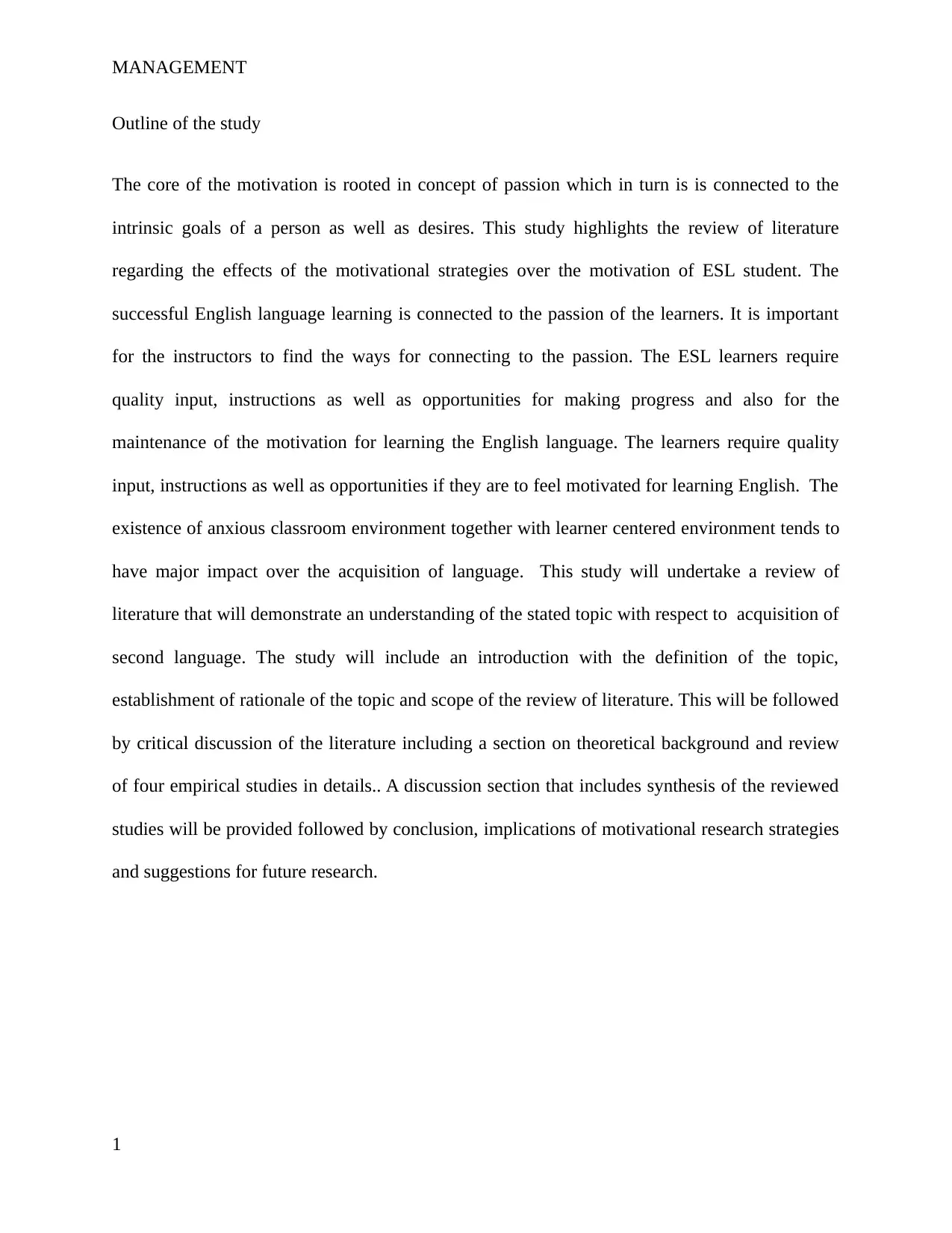
MANAGEMENT
Outline of the study
The core of the motivation is rooted in concept of passion which in turn is is connected to the
intrinsic goals of a person as well as desires. This study highlights the review of literature
regarding the effects of the motivational strategies over the motivation of ESL student. The
successful English language learning is connected to the passion of the learners. It is important
for the instructors to find the ways for connecting to the passion. The ESL learners require
quality input, instructions as well as opportunities for making progress and also for the
maintenance of the motivation for learning the English language. The learners require quality
input, instructions as well as opportunities if they are to feel motivated for learning English. The
existence of anxious classroom environment together with learner centered environment tends to
have major impact over the acquisition of language. This study will undertake a review of
literature that will demonstrate an understanding of the stated topic with respect to acquisition of
second language. The study will include an introduction with the definition of the topic,
establishment of rationale of the topic and scope of the review of literature. This will be followed
by critical discussion of the literature including a section on theoretical background and review
of four empirical studies in details.. A discussion section that includes synthesis of the reviewed
studies will be provided followed by conclusion, implications of motivational research strategies
and suggestions for future research.
1
Outline of the study
The core of the motivation is rooted in concept of passion which in turn is is connected to the
intrinsic goals of a person as well as desires. This study highlights the review of literature
regarding the effects of the motivational strategies over the motivation of ESL student. The
successful English language learning is connected to the passion of the learners. It is important
for the instructors to find the ways for connecting to the passion. The ESL learners require
quality input, instructions as well as opportunities for making progress and also for the
maintenance of the motivation for learning the English language. The learners require quality
input, instructions as well as opportunities if they are to feel motivated for learning English. The
existence of anxious classroom environment together with learner centered environment tends to
have major impact over the acquisition of language. This study will undertake a review of
literature that will demonstrate an understanding of the stated topic with respect to acquisition of
second language. The study will include an introduction with the definition of the topic,
establishment of rationale of the topic and scope of the review of literature. This will be followed
by critical discussion of the literature including a section on theoretical background and review
of four empirical studies in details.. A discussion section that includes synthesis of the reviewed
studies will be provided followed by conclusion, implications of motivational research strategies
and suggestions for future research.
1
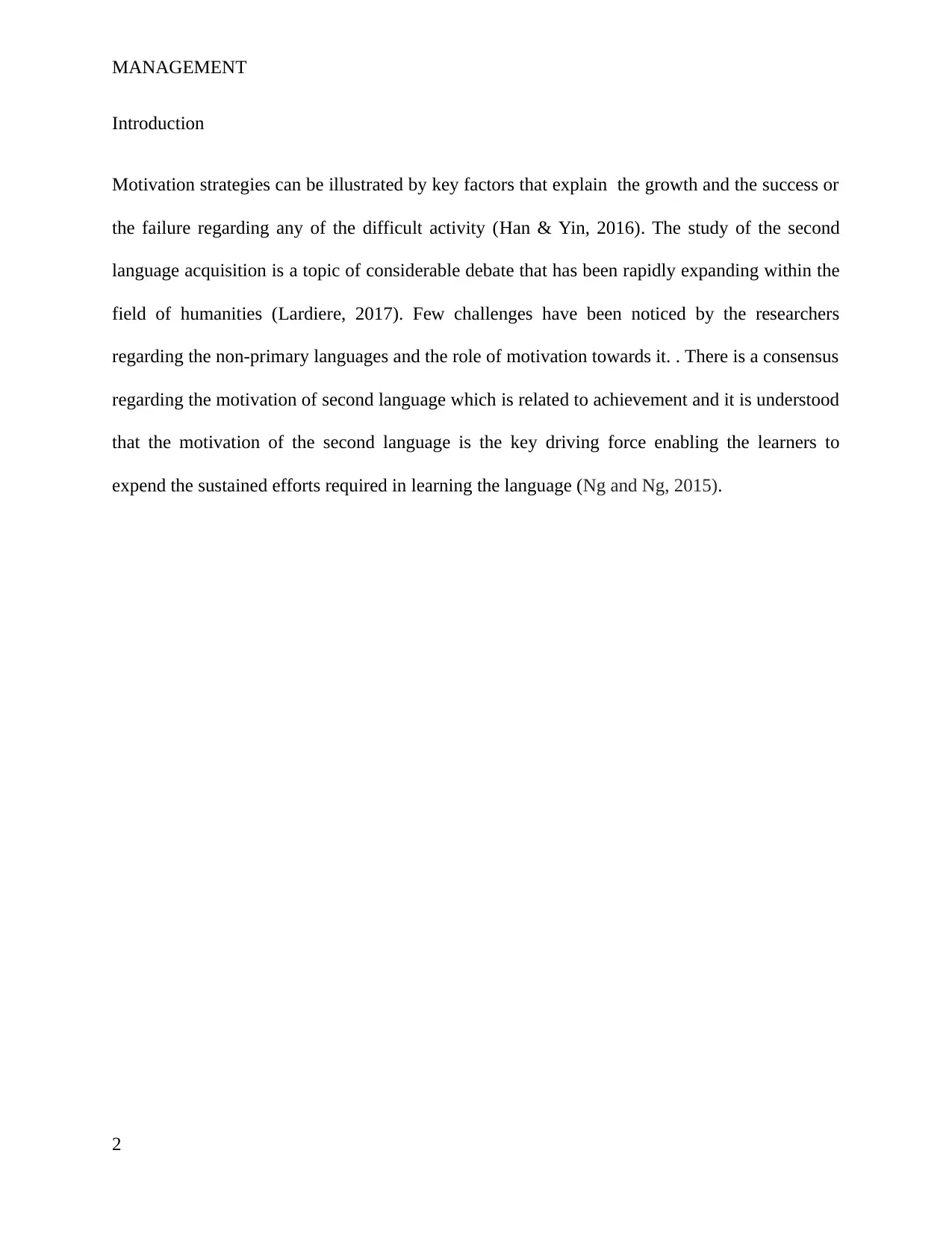
MANAGEMENT
Introduction
Motivation strategies can be illustrated by key factors that explain the growth and the success or
the failure regarding any of the difficult activity (Han & Yin, 2016). The study of the second
language acquisition is a topic of considerable debate that has been rapidly expanding within the
field of humanities (Lardiere, 2017). Few challenges have been noticed by the researchers
regarding the non-primary languages and the role of motivation towards it. . There is a consensus
regarding the motivation of second language which is related to achievement and it is understood
that the motivation of the second language is the key driving force enabling the learners to
expend the sustained efforts required in learning the language (Ng and Ng, 2015).
2
Introduction
Motivation strategies can be illustrated by key factors that explain the growth and the success or
the failure regarding any of the difficult activity (Han & Yin, 2016). The study of the second
language acquisition is a topic of considerable debate that has been rapidly expanding within the
field of humanities (Lardiere, 2017). Few challenges have been noticed by the researchers
regarding the non-primary languages and the role of motivation towards it. . There is a consensus
regarding the motivation of second language which is related to achievement and it is understood
that the motivation of the second language is the key driving force enabling the learners to
expend the sustained efforts required in learning the language (Ng and Ng, 2015).
2
⊘ This is a preview!⊘
Do you want full access?
Subscribe today to unlock all pages.

Trusted by 1+ million students worldwide
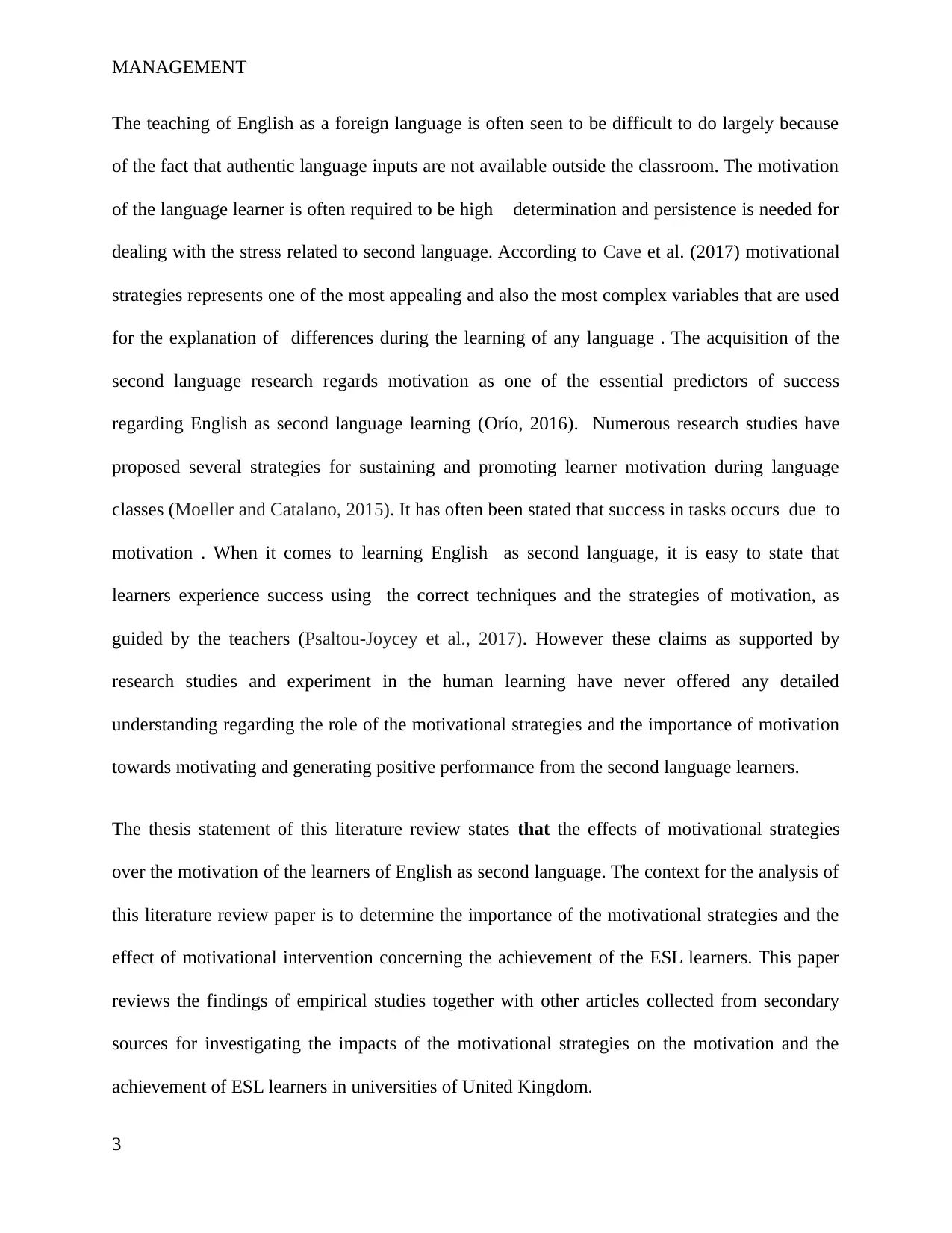
MANAGEMENT
The teaching of English as a foreign language is often seen to be difficult to do largely because
of the fact that authentic language inputs are not available outside the classroom. The motivation
of the language learner is often required to be high determination and persistence is needed for
dealing with the stress related to second language. According to Cave et al. (2017) motivational
strategies represents one of the most appealing and also the most complex variables that are used
for the explanation of differences during the learning of any language . The acquisition of the
second language research regards motivation as one of the essential predictors of success
regarding English as second language learning (Orío, 2016). Numerous research studies have
proposed several strategies for sustaining and promoting learner motivation during language
classes (Moeller and Catalano, 2015). It has often been stated that success in tasks occurs due to
motivation . When it comes to learning English as second language, it is easy to state that
learners experience success using the correct techniques and the strategies of motivation, as
guided by the teachers (Psaltou-Joycey et al., 2017). However these claims as supported by
research studies and experiment in the human learning have never offered any detailed
understanding regarding the role of the motivational strategies and the importance of motivation
towards motivating and generating positive performance from the second language learners.
The thesis statement of this literature review states that the effects of motivational strategies
over the motivation of the learners of English as second language. The context for the analysis of
this literature review paper is to determine the importance of the motivational strategies and the
effect of motivational intervention concerning the achievement of the ESL learners. This paper
reviews the findings of empirical studies together with other articles collected from secondary
sources for investigating the impacts of the motivational strategies on the motivation and the
achievement of ESL learners in universities of United Kingdom.
3
The teaching of English as a foreign language is often seen to be difficult to do largely because
of the fact that authentic language inputs are not available outside the classroom. The motivation
of the language learner is often required to be high determination and persistence is needed for
dealing with the stress related to second language. According to Cave et al. (2017) motivational
strategies represents one of the most appealing and also the most complex variables that are used
for the explanation of differences during the learning of any language . The acquisition of the
second language research regards motivation as one of the essential predictors of success
regarding English as second language learning (Orío, 2016). Numerous research studies have
proposed several strategies for sustaining and promoting learner motivation during language
classes (Moeller and Catalano, 2015). It has often been stated that success in tasks occurs due to
motivation . When it comes to learning English as second language, it is easy to state that
learners experience success using the correct techniques and the strategies of motivation, as
guided by the teachers (Psaltou-Joycey et al., 2017). However these claims as supported by
research studies and experiment in the human learning have never offered any detailed
understanding regarding the role of the motivational strategies and the importance of motivation
towards motivating and generating positive performance from the second language learners.
The thesis statement of this literature review states that the effects of motivational strategies
over the motivation of the learners of English as second language. The context for the analysis of
this literature review paper is to determine the importance of the motivational strategies and the
effect of motivational intervention concerning the achievement of the ESL learners. This paper
reviews the findings of empirical studies together with other articles collected from secondary
sources for investigating the impacts of the motivational strategies on the motivation and the
achievement of ESL learners in universities of United Kingdom.
3
Paraphrase This Document
Need a fresh take? Get an instant paraphrase of this document with our AI Paraphraser
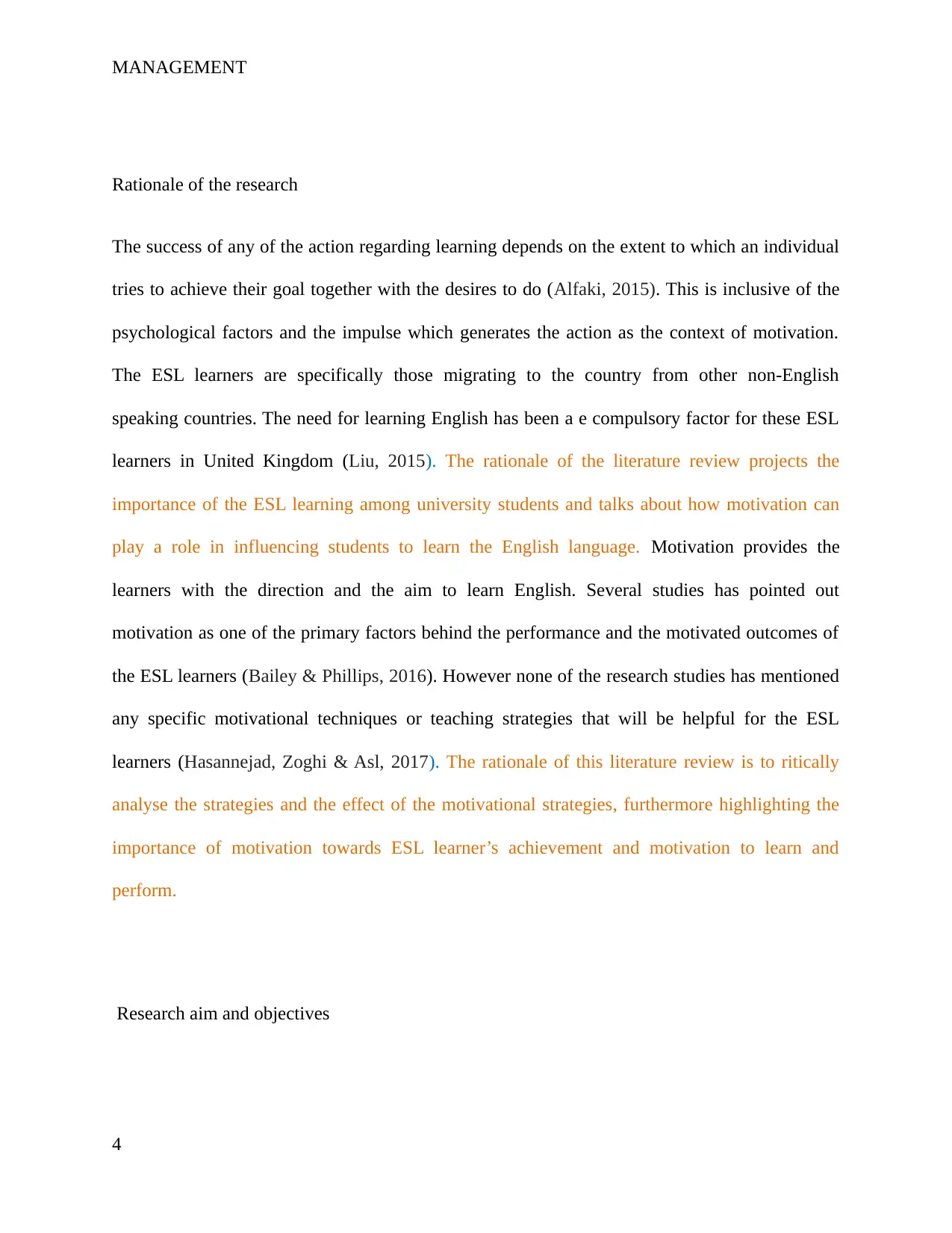
MANAGEMENT
Rationale of the research
The success of any of the action regarding learning depends on the extent to which an individual
tries to achieve their goal together with the desires to do (Alfaki, 2015). This is inclusive of the
psychological factors and the impulse which generates the action as the context of motivation.
The ESL learners are specifically those migrating to the country from other non-English
speaking countries. The need for learning English has been a e compulsory factor for these ESL
learners in United Kingdom (Liu, 2015). The rationale of the literature review projects the
importance of the ESL learning among university students and talks about how motivation can
play a role in influencing students to learn the English language. Motivation provides the
learners with the direction and the aim to learn English. Several studies has pointed out
motivation as one of the primary factors behind the performance and the motivated outcomes of
the ESL learners (Bailey & Phillips, 2016). However none of the research studies has mentioned
any specific motivational techniques or teaching strategies that will be helpful for the ESL
learners (Hasannejad, Zoghi & Asl, 2017). The rationale of this literature review is to ritically
analyse the strategies and the effect of the motivational strategies, furthermore highlighting the
importance of motivation towards ESL learner’s achievement and motivation to learn and
perform.
Research aim and objectives
4
Rationale of the research
The success of any of the action regarding learning depends on the extent to which an individual
tries to achieve their goal together with the desires to do (Alfaki, 2015). This is inclusive of the
psychological factors and the impulse which generates the action as the context of motivation.
The ESL learners are specifically those migrating to the country from other non-English
speaking countries. The need for learning English has been a e compulsory factor for these ESL
learners in United Kingdom (Liu, 2015). The rationale of the literature review projects the
importance of the ESL learning among university students and talks about how motivation can
play a role in influencing students to learn the English language. Motivation provides the
learners with the direction and the aim to learn English. Several studies has pointed out
motivation as one of the primary factors behind the performance and the motivated outcomes of
the ESL learners (Bailey & Phillips, 2016). However none of the research studies has mentioned
any specific motivational techniques or teaching strategies that will be helpful for the ESL
learners (Hasannejad, Zoghi & Asl, 2017). The rationale of this literature review is to ritically
analyse the strategies and the effect of the motivational strategies, furthermore highlighting the
importance of motivation towards ESL learner’s achievement and motivation to learn and
perform.
Research aim and objectives
4
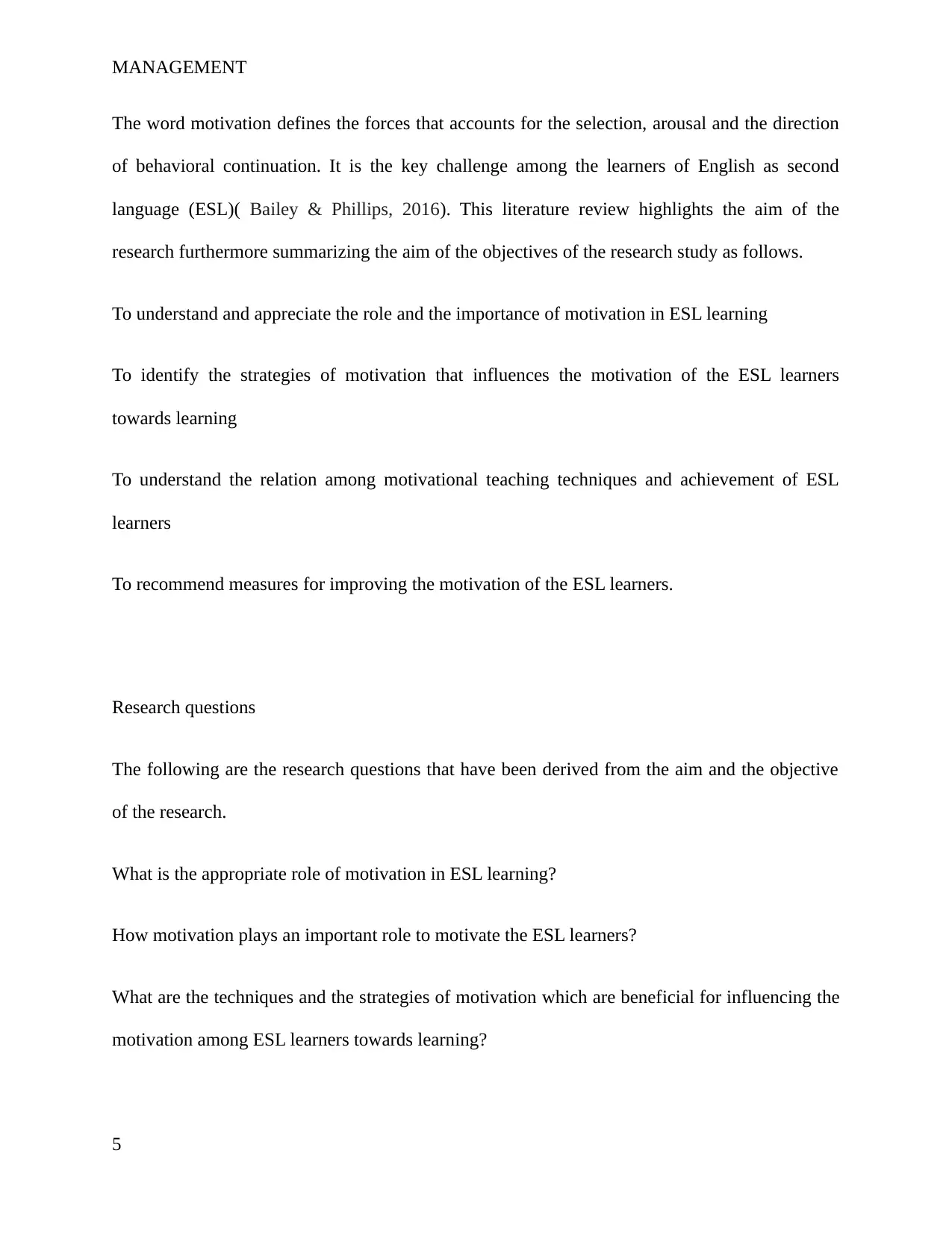
MANAGEMENT
The word motivation defines the forces that accounts for the selection, arousal and the direction
of behavioral continuation. It is the key challenge among the learners of English as second
language (ESL)( Bailey & Phillips, 2016). This literature review highlights the aim of the
research furthermore summarizing the aim of the objectives of the research study as follows.
To understand and appreciate the role and the importance of motivation in ESL learning
To identify the strategies of motivation that influences the motivation of the ESL learners
towards learning
To understand the relation among motivational teaching techniques and achievement of ESL
learners
To recommend measures for improving the motivation of the ESL learners.
Research questions
The following are the research questions that have been derived from the aim and the objective
of the research.
What is the appropriate role of motivation in ESL learning?
How motivation plays an important role to motivate the ESL learners?
What are the techniques and the strategies of motivation which are beneficial for influencing the
motivation among ESL learners towards learning?
5
The word motivation defines the forces that accounts for the selection, arousal and the direction
of behavioral continuation. It is the key challenge among the learners of English as second
language (ESL)( Bailey & Phillips, 2016). This literature review highlights the aim of the
research furthermore summarizing the aim of the objectives of the research study as follows.
To understand and appreciate the role and the importance of motivation in ESL learning
To identify the strategies of motivation that influences the motivation of the ESL learners
towards learning
To understand the relation among motivational teaching techniques and achievement of ESL
learners
To recommend measures for improving the motivation of the ESL learners.
Research questions
The following are the research questions that have been derived from the aim and the objective
of the research.
What is the appropriate role of motivation in ESL learning?
How motivation plays an important role to motivate the ESL learners?
What are the techniques and the strategies of motivation which are beneficial for influencing the
motivation among ESL learners towards learning?
5
⊘ This is a preview!⊘
Do you want full access?
Subscribe today to unlock all pages.

Trusted by 1+ million students worldwide
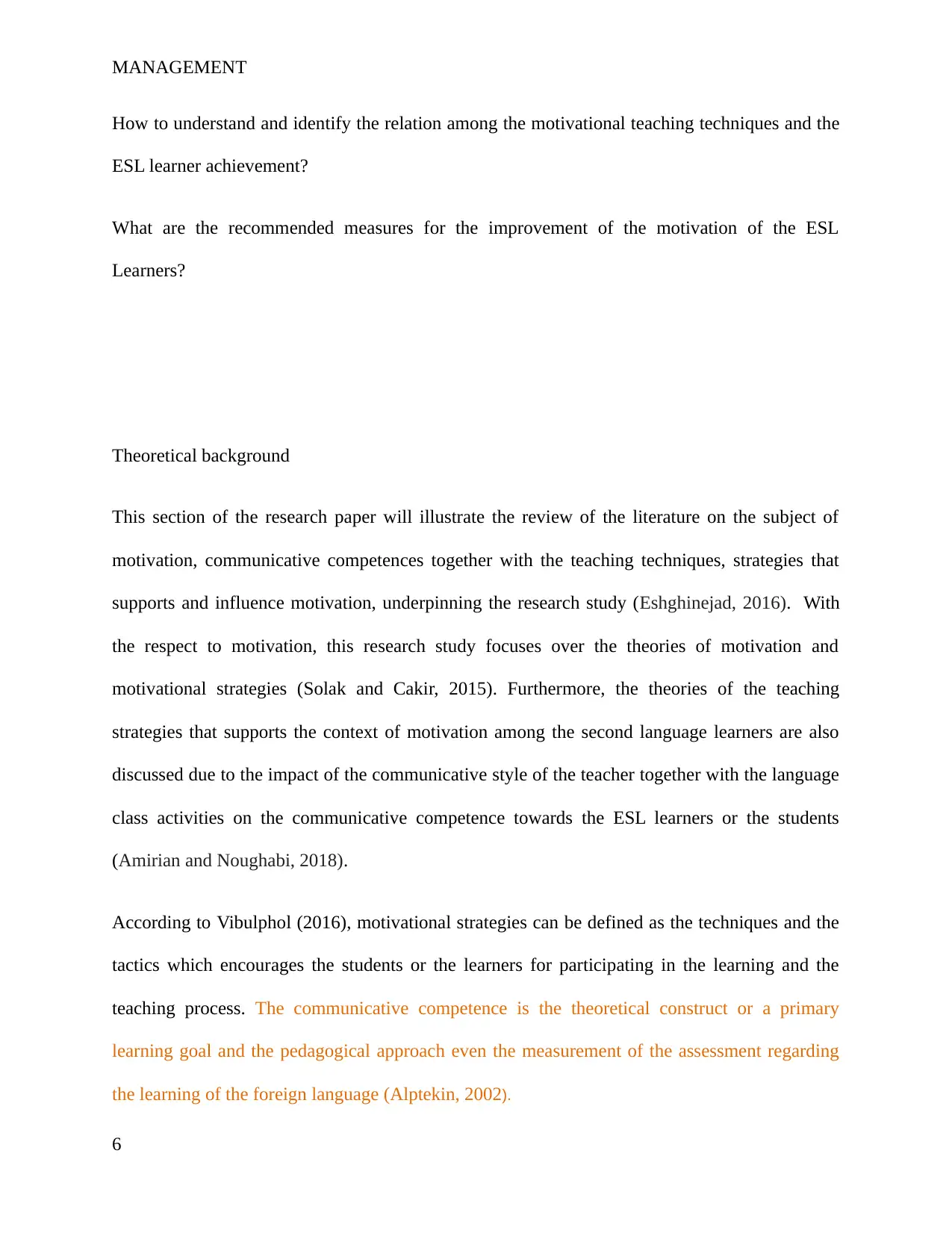
MANAGEMENT
How to understand and identify the relation among the motivational teaching techniques and the
ESL learner achievement?
What are the recommended measures for the improvement of the motivation of the ESL
Learners?
Theoretical background
This section of the research paper will illustrate the review of the literature on the subject of
motivation, communicative competences together with the teaching techniques, strategies that
supports and influence motivation, underpinning the research study (Eshghinejad, 2016). With
the respect to motivation, this research study focuses over the theories of motivation and
motivational strategies (Solak and Cakir, 2015). Furthermore, the theories of the teaching
strategies that supports the context of motivation among the second language learners are also
discussed due to the impact of the communicative style of the teacher together with the language
class activities on the communicative competence towards the ESL learners or the students
(Amirian and Noughabi, 2018).
According to Vibulphol (2016), motivational strategies can be defined as the techniques and the
tactics which encourages the students or the learners for participating in the learning and the
teaching process. The communicative competence is the theoretical construct or a primary
learning goal and the pedagogical approach even the measurement of the assessment regarding
the learning of the foreign language (Alptekin, 2002).
6
How to understand and identify the relation among the motivational teaching techniques and the
ESL learner achievement?
What are the recommended measures for the improvement of the motivation of the ESL
Learners?
Theoretical background
This section of the research paper will illustrate the review of the literature on the subject of
motivation, communicative competences together with the teaching techniques, strategies that
supports and influence motivation, underpinning the research study (Eshghinejad, 2016). With
the respect to motivation, this research study focuses over the theories of motivation and
motivational strategies (Solak and Cakir, 2015). Furthermore, the theories of the teaching
strategies that supports the context of motivation among the second language learners are also
discussed due to the impact of the communicative style of the teacher together with the language
class activities on the communicative competence towards the ESL learners or the students
(Amirian and Noughabi, 2018).
According to Vibulphol (2016), motivational strategies can be defined as the techniques and the
tactics which encourages the students or the learners for participating in the learning and the
teaching process. The communicative competence is the theoretical construct or a primary
learning goal and the pedagogical approach even the measurement of the assessment regarding
the learning of the foreign language (Alptekin, 2002).
6
Paraphrase This Document
Need a fresh take? Get an instant paraphrase of this document with our AI Paraphraser
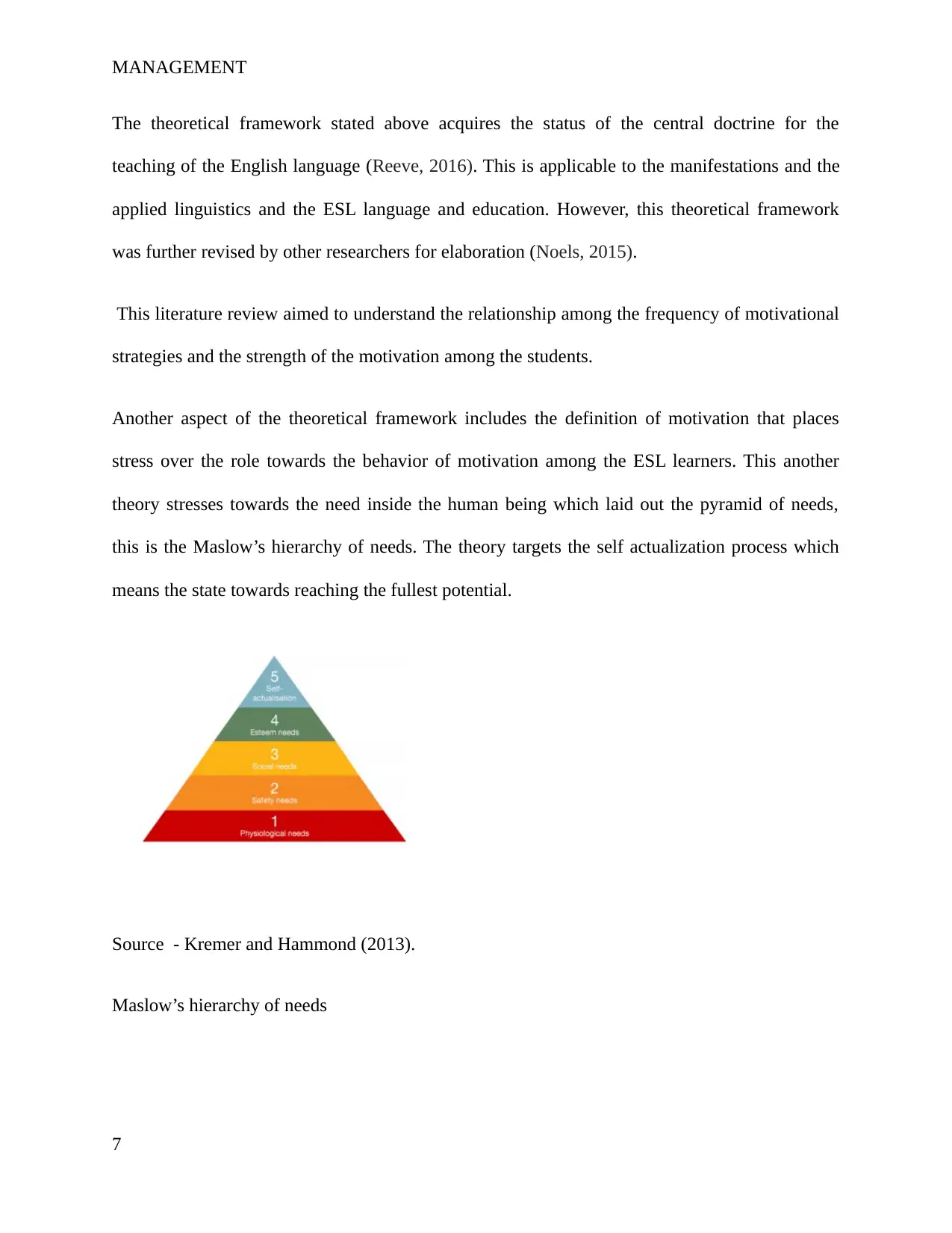
MANAGEMENT
The theoretical framework stated above acquires the status of the central doctrine for the
teaching of the English language (Reeve, 2016). This is applicable to the manifestations and the
applied linguistics and the ESL language and education. However, this theoretical framework
was further revised by other researchers for elaboration (Noels, 2015).
This literature review aimed to understand the relationship among the frequency of motivational
strategies and the strength of the motivation among the students.
Another aspect of the theoretical framework includes the definition of motivation that places
stress over the role towards the behavior of motivation among the ESL learners. This another
theory stresses towards the need inside the human being which laid out the pyramid of needs,
this is the Maslow’s hierarchy of needs. The theory targets the self actualization process which
means the state towards reaching the fullest potential.
Source - Kremer and Hammond (2013).
Maslow’s hierarchy of needs
7
The theoretical framework stated above acquires the status of the central doctrine for the
teaching of the English language (Reeve, 2016). This is applicable to the manifestations and the
applied linguistics and the ESL language and education. However, this theoretical framework
was further revised by other researchers for elaboration (Noels, 2015).
This literature review aimed to understand the relationship among the frequency of motivational
strategies and the strength of the motivation among the students.
Another aspect of the theoretical framework includes the definition of motivation that places
stress over the role towards the behavior of motivation among the ESL learners. This another
theory stresses towards the need inside the human being which laid out the pyramid of needs,
this is the Maslow’s hierarchy of needs. The theory targets the self actualization process which
means the state towards reaching the fullest potential.
Source - Kremer and Hammond (2013).
Maslow’s hierarchy of needs
7
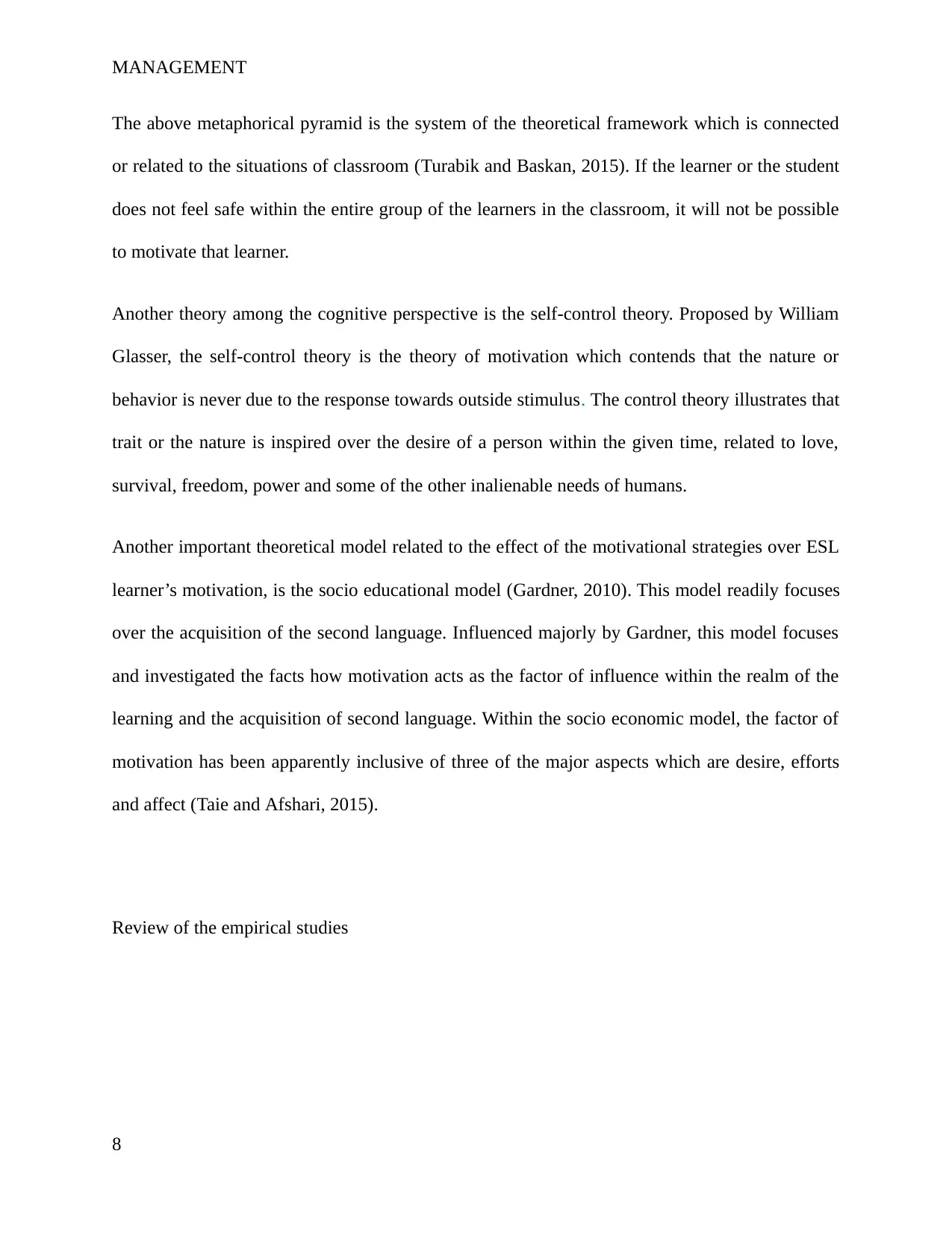
MANAGEMENT
The above metaphorical pyramid is the system of the theoretical framework which is connected
or related to the situations of classroom (Turabik and Baskan, 2015). If the learner or the student
does not feel safe within the entire group of the learners in the classroom, it will not be possible
to motivate that learner.
Another theory among the cognitive perspective is the self-control theory. Proposed by William
Glasser, the self-control theory is the theory of motivation which contends that the nature or
behavior is never due to the response towards outside stimulus. The control theory illustrates that
trait or the nature is inspired over the desire of a person within the given time, related to love,
survival, freedom, power and some of the other inalienable needs of humans.
Another important theoretical model related to the effect of the motivational strategies over ESL
learner’s motivation, is the socio educational model (Gardner, 2010). This model readily focuses
over the acquisition of the second language. Influenced majorly by Gardner, this model focuses
and investigated the facts how motivation acts as the factor of influence within the realm of the
learning and the acquisition of second language. Within the socio economic model, the factor of
motivation has been apparently inclusive of three of the major aspects which are desire, efforts
and affect (Taie and Afshari, 2015).
Review of the empirical studies
8
The above metaphorical pyramid is the system of the theoretical framework which is connected
or related to the situations of classroom (Turabik and Baskan, 2015). If the learner or the student
does not feel safe within the entire group of the learners in the classroom, it will not be possible
to motivate that learner.
Another theory among the cognitive perspective is the self-control theory. Proposed by William
Glasser, the self-control theory is the theory of motivation which contends that the nature or
behavior is never due to the response towards outside stimulus. The control theory illustrates that
trait or the nature is inspired over the desire of a person within the given time, related to love,
survival, freedom, power and some of the other inalienable needs of humans.
Another important theoretical model related to the effect of the motivational strategies over ESL
learner’s motivation, is the socio educational model (Gardner, 2010). This model readily focuses
over the acquisition of the second language. Influenced majorly by Gardner, this model focuses
and investigated the facts how motivation acts as the factor of influence within the realm of the
learning and the acquisition of second language. Within the socio economic model, the factor of
motivation has been apparently inclusive of three of the major aspects which are desire, efforts
and affect (Taie and Afshari, 2015).
Review of the empirical studies
8
⊘ This is a preview!⊘
Do you want full access?
Subscribe today to unlock all pages.

Trusted by 1+ million students worldwide
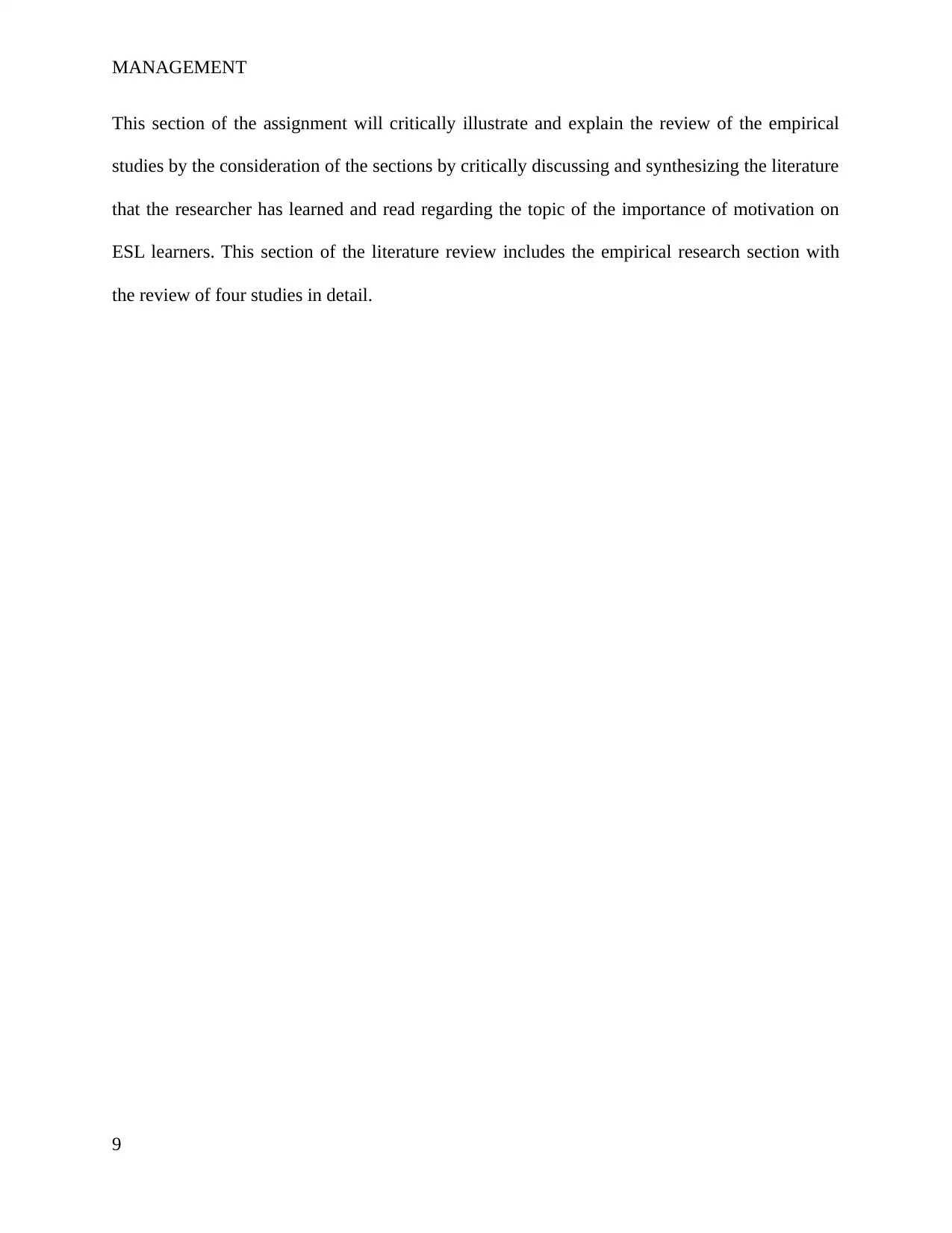
MANAGEMENT
This section of the assignment will critically illustrate and explain the review of the empirical
studies by the consideration of the sections by critically discussing and synthesizing the literature
that the researcher has learned and read regarding the topic of the importance of motivation on
ESL learners. This section of the literature review includes the empirical research section with
the review of four studies in detail.
9
This section of the assignment will critically illustrate and explain the review of the empirical
studies by the consideration of the sections by critically discussing and synthesizing the literature
that the researcher has learned and read regarding the topic of the importance of motivation on
ESL learners. This section of the literature review includes the empirical research section with
the review of four studies in detail.
9
Paraphrase This Document
Need a fresh take? Get an instant paraphrase of this document with our AI Paraphraser
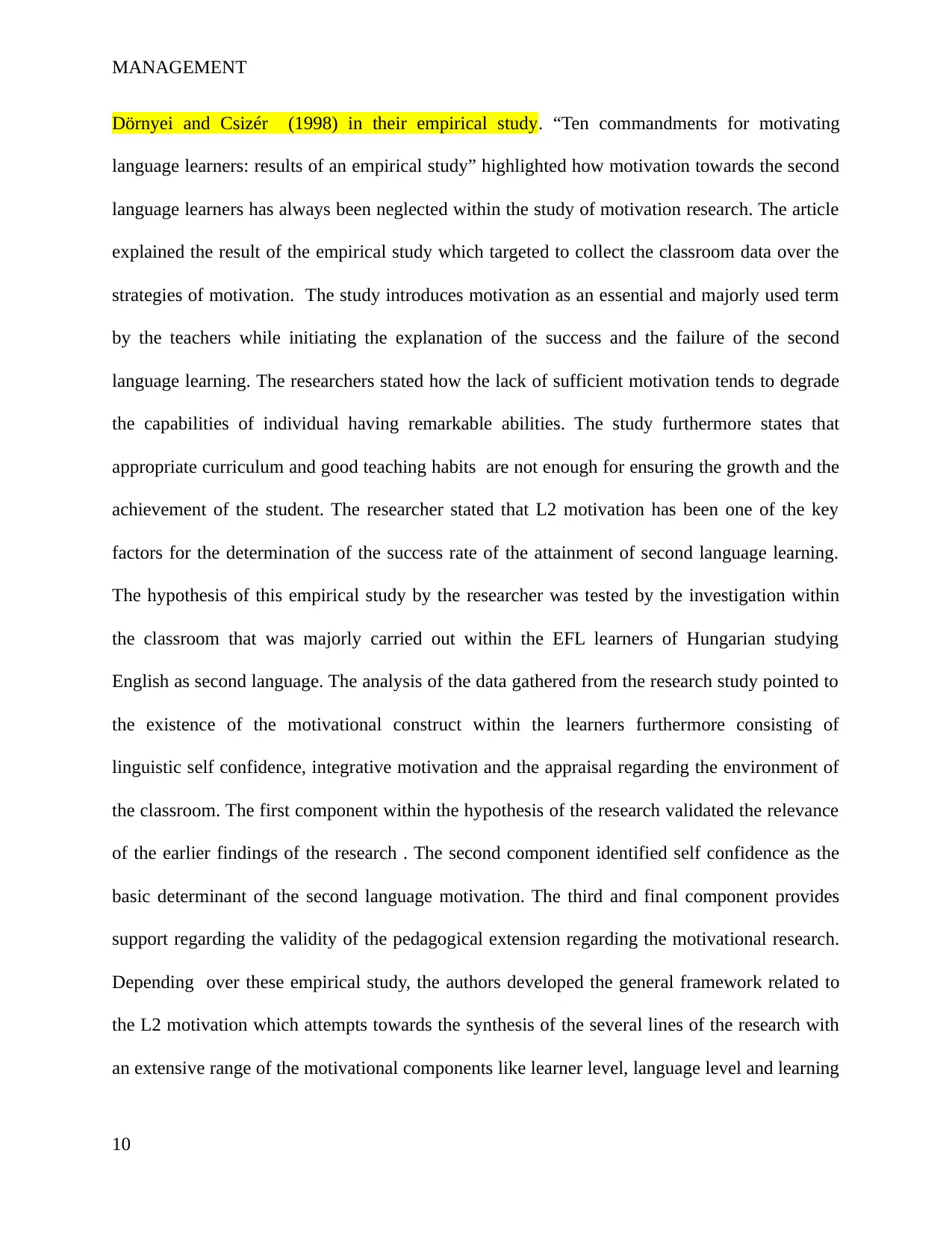
MANAGEMENT
Dörnyei and Csizér (1998) in their empirical study. “Ten commandments for motivating
language learners: results of an empirical study” highlighted how motivation towards the second
language learners has always been neglected within the study of motivation research. The article
explained the result of the empirical study which targeted to collect the classroom data over the
strategies of motivation. The study introduces motivation as an essential and majorly used term
by the teachers while initiating the explanation of the success and the failure of the second
language learning. The researchers stated how the lack of sufficient motivation tends to degrade
the capabilities of individual having remarkable abilities. The study furthermore states that
appropriate curriculum and good teaching habits are not enough for ensuring the growth and the
achievement of the student. The researcher stated that L2 motivation has been one of the key
factors for the determination of the success rate of the attainment of second language learning.
The hypothesis of this empirical study by the researcher was tested by the investigation within
the classroom that was majorly carried out within the EFL learners of Hungarian studying
English as second language. The analysis of the data gathered from the research study pointed to
the existence of the motivational construct within the learners furthermore consisting of
linguistic self confidence, integrative motivation and the appraisal regarding the environment of
the classroom. The first component within the hypothesis of the research validated the relevance
of the earlier findings of the research . The second component identified self confidence as the
basic determinant of the second language motivation. The third and final component provides
support regarding the validity of the pedagogical extension regarding the motivational research.
Depending over these empirical study, the authors developed the general framework related to
the L2 motivation which attempts towards the synthesis of the several lines of the research with
an extensive range of the motivational components like learner level, language level and learning
10
Dörnyei and Csizér (1998) in their empirical study. “Ten commandments for motivating
language learners: results of an empirical study” highlighted how motivation towards the second
language learners has always been neglected within the study of motivation research. The article
explained the result of the empirical study which targeted to collect the classroom data over the
strategies of motivation. The study introduces motivation as an essential and majorly used term
by the teachers while initiating the explanation of the success and the failure of the second
language learning. The researchers stated how the lack of sufficient motivation tends to degrade
the capabilities of individual having remarkable abilities. The study furthermore states that
appropriate curriculum and good teaching habits are not enough for ensuring the growth and the
achievement of the student. The researcher stated that L2 motivation has been one of the key
factors for the determination of the success rate of the attainment of second language learning.
The hypothesis of this empirical study by the researcher was tested by the investigation within
the classroom that was majorly carried out within the EFL learners of Hungarian studying
English as second language. The analysis of the data gathered from the research study pointed to
the existence of the motivational construct within the learners furthermore consisting of
linguistic self confidence, integrative motivation and the appraisal regarding the environment of
the classroom. The first component within the hypothesis of the research validated the relevance
of the earlier findings of the research . The second component identified self confidence as the
basic determinant of the second language motivation. The third and final component provides
support regarding the validity of the pedagogical extension regarding the motivational research.
Depending over these empirical study, the authors developed the general framework related to
the L2 motivation which attempts towards the synthesis of the several lines of the research with
an extensive range of the motivational components like learner level, language level and learning
10
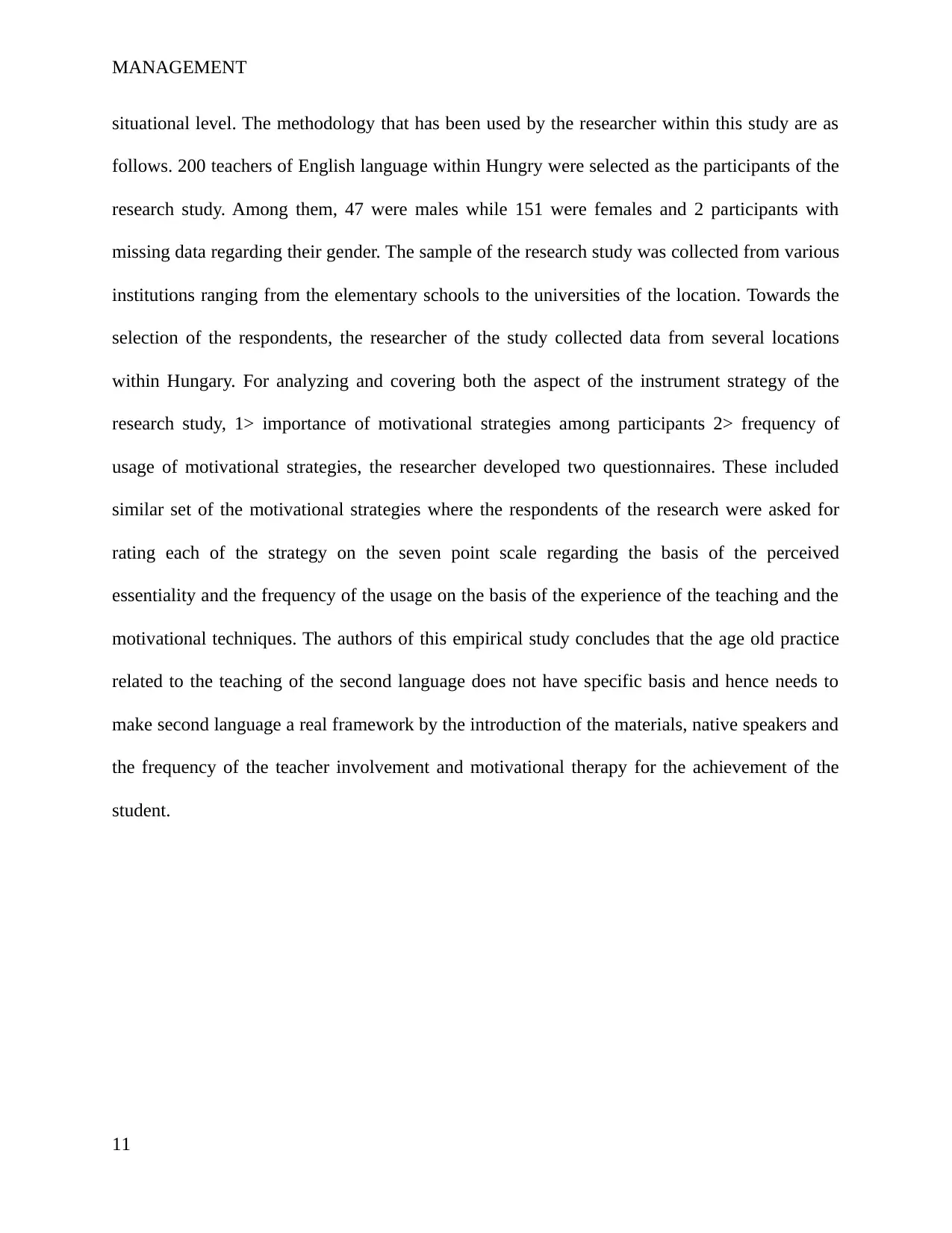
MANAGEMENT
situational level. The methodology that has been used by the researcher within this study are as
follows. 200 teachers of English language within Hungry were selected as the participants of the
research study. Among them, 47 were males while 151 were females and 2 participants with
missing data regarding their gender. The sample of the research study was collected from various
institutions ranging from the elementary schools to the universities of the location. Towards the
selection of the respondents, the researcher of the study collected data from several locations
within Hungary. For analyzing and covering both the aspect of the instrument strategy of the
research study, 1> importance of motivational strategies among participants 2> frequency of
usage of motivational strategies, the researcher developed two questionnaires. These included
similar set of the motivational strategies where the respondents of the research were asked for
rating each of the strategy on the seven point scale regarding the basis of the perceived
essentiality and the frequency of the usage on the basis of the experience of the teaching and the
motivational techniques. The authors of this empirical study concludes that the age old practice
related to the teaching of the second language does not have specific basis and hence needs to
make second language a real framework by the introduction of the materials, native speakers and
the frequency of the teacher involvement and motivational therapy for the achievement of the
student.
11
situational level. The methodology that has been used by the researcher within this study are as
follows. 200 teachers of English language within Hungry were selected as the participants of the
research study. Among them, 47 were males while 151 were females and 2 participants with
missing data regarding their gender. The sample of the research study was collected from various
institutions ranging from the elementary schools to the universities of the location. Towards the
selection of the respondents, the researcher of the study collected data from several locations
within Hungary. For analyzing and covering both the aspect of the instrument strategy of the
research study, 1> importance of motivational strategies among participants 2> frequency of
usage of motivational strategies, the researcher developed two questionnaires. These included
similar set of the motivational strategies where the respondents of the research were asked for
rating each of the strategy on the seven point scale regarding the basis of the perceived
essentiality and the frequency of the usage on the basis of the experience of the teaching and the
motivational techniques. The authors of this empirical study concludes that the age old practice
related to the teaching of the second language does not have specific basis and hence needs to
make second language a real framework by the introduction of the materials, native speakers and
the frequency of the teacher involvement and motivational therapy for the achievement of the
student.
11
⊘ This is a preview!⊘
Do you want full access?
Subscribe today to unlock all pages.

Trusted by 1+ million students worldwide
1 out of 25
Related Documents
Your All-in-One AI-Powered Toolkit for Academic Success.
+13062052269
info@desklib.com
Available 24*7 on WhatsApp / Email
![[object Object]](/_next/static/media/star-bottom.7253800d.svg)
Unlock your academic potential
Copyright © 2020–2026 A2Z Services. All Rights Reserved. Developed and managed by ZUCOL.




